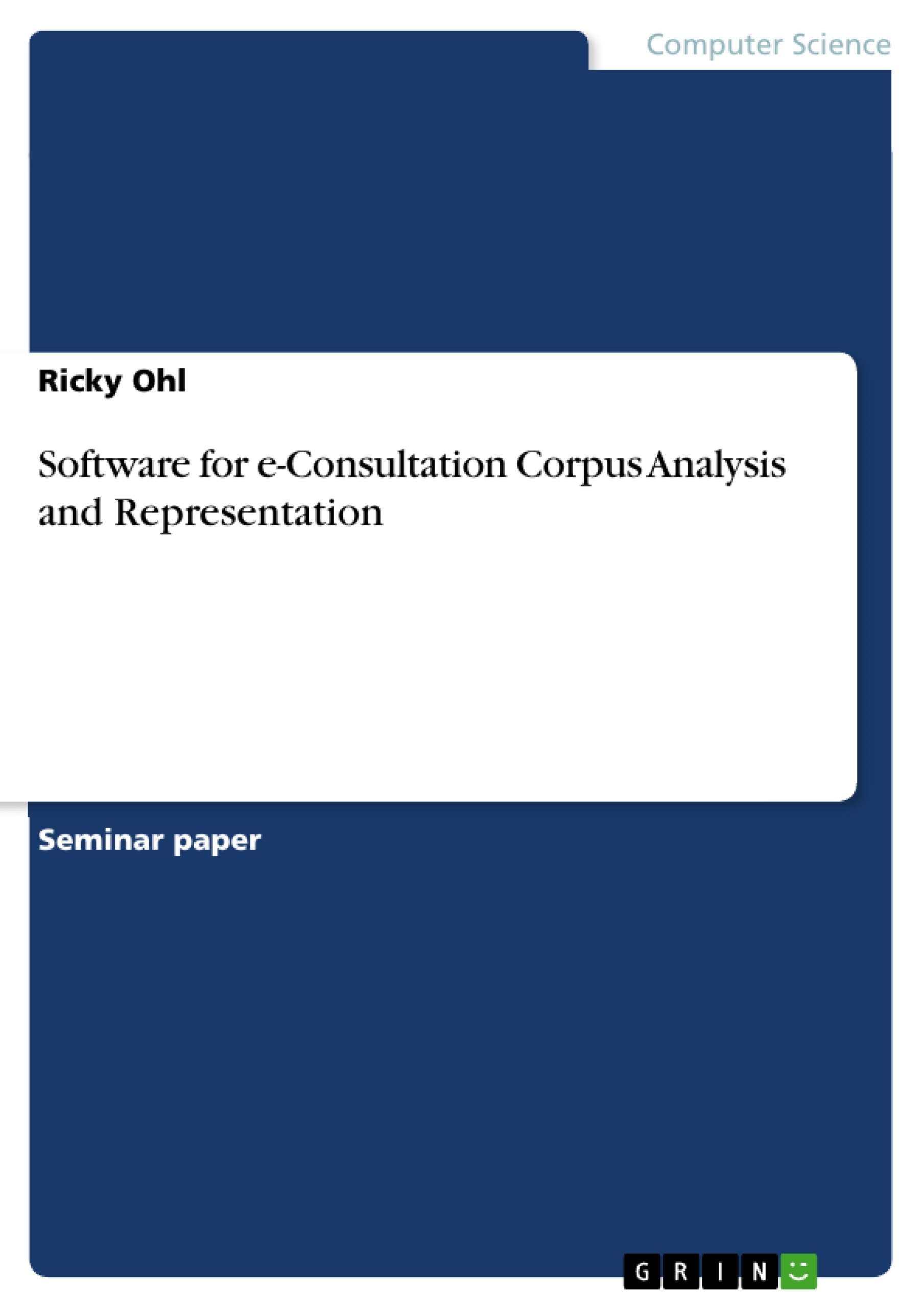The global phenomenon of electronic(e)-governance and the advanced capacity for information generation by information and communication technologies (ICTs) have contributed to the perceived problem of information overload. In participatory democracy and specifically e-democracy and e-consultation, in which a vast quantity and array of textual discourse can be generated, effective and efficient information processing is important. Effective and efficient processing will assist participants to make-sense of and remain engaged in consultations. Accordingly, tools and technologies to assist in the analysis, synthesis and dissemination of such discourse have the potential to make a salient contribution. In this article, a critique of several software packages, consisting of qualitative text analysis, natural language text mining and computer supported argument visualisation software is presented. The use of natural language text mining software with sentiment analysis features was the initial focus of this investigation. However, early in the investigation and after a software trial, natural language text mining software was considered underdeveloped with regard to the specific functionality sought. Hence, the investigation then focused primarily on the utility of computer supported argument visualisation (CSAV) and also text analysis software. For text analysis, Leximancer, Text Analyst Atlas.ti. and TextSTAT were preferred and chosen from among eleven programmes investigated. For CSAV software, a programme called Compendium was preferred and chosen from among twelve programmes investigated.
Inhaltsverzeichnis (Table of Contents)
- SOFTWARE FOR E-CONSULTATION CORPUS ANALYSIS AND REPRESENTATION.
- ABSTRACT
- E-DEMOCRACY AND E-CONSULTATION.
- PARTICIPATORY PLANNING.
- ICTS, INFORMATION OVERLOAD AND INFORMATION PROCESSING
- CSAV.
- SOFTWARE APPLICATION
- Text Mining Software in e-Consultation.
- Qualitative Text Analysis Software
- Software Functionality Sought.
- SOFTWARE INVESTIGATED
- Semi-Automated Text Mining Software..
- Manual Text Analysis Software...
- Text Analysis Software Preferences..
- SUBMISSIONS' ANALYSIS PROCESS & CSAV MAPPING
- Manual Search Terms Used
- CSAV SOFTWARE..
- CSAV Software Investigated.
- CSAV Software Preference.
- CONCLUSION
Zielsetzung und Themenschwerpunkte (Objectives and Key Themes)
This article explores the use of software packages to effectively analyze and represent data from e-consultation forums in participatory democracy. The author aims to address the problem of information overload caused by the rapid increase of data in e-governance platforms. This investigation focuses on the utility of qualitative text analysis, natural language text mining, and computer-supported argument visualization (CSAV) software to effectively manage and process this data.
- Information overload in e-democracy and e-consultation
- The application of ICTs for effective information processing
- Qualitative text analysis software for data analysis and synthesis
- Computer-supported argument visualization (CSAV) for data representation
- The challenges and opportunities of using software for participatory planning
Zusammenfassung der Kapitel (Chapter Summaries)
The article begins by introducing the concept of e-democracy and e-consultation, highlighting the increasing use of ICTs for public engagement in democratic processes. It then explores the challenges of information overload in participatory planning and how it can hinder effective decision-making. The author delves into the potential of ICTs as both contributors to and solutions for this problem, particularly in the context of analyzing large volumes of data generated in e-consultation forums.
The article then focuses on the specific software packages investigated for text analysis and CSAV, including a detailed overview of their functionality and suitability for e-consultation data analysis. The author discusses the challenges encountered with natural language text mining software and ultimately focuses on the preferred options for qualitative text analysis and CSAV. The chapter explores the process of analyzing e-consultation submissions using manual search terms and CSAV mapping techniques.
Schlüsselwörter (Keywords)
The main focus of this article is on analyzing and representing data from e-consultation forums using software solutions. Key areas of interest include computer-supported argument visualization (CSAV), knowledge cartography, qualitative text analysis, e-democracy, e-consultation, natural language text mining, and wicked problems. The author explores the potential of these tools and methods to address the challenges of information overload in participatory planning and enhance the effectiveness of public engagement in democratic processes.
Frequently Asked Questions
What is information overload in e-consultation?
It refers to the vast quantity of textual discourse generated in digital democracy platforms, which makes it difficult for participants to process and understand the data.
What is CSAV software?
Computer Supported Argument Visualisation (CSAV) tools help represent complex debates and arguments visually, making them easier to navigate.
Which software is recommended for text analysis?
The article highlights Leximancer, Text Analyst, Atlas.ti, and TextSTAT as preferred tools for qualitative text analysis.
Why was text mining software considered underdeveloped?
During trials, it was found that the specific sentiment analysis and automated functionalities needed for e-consultations were not yet fully mature.
How does Compendium software help in democracy?
Compendium is a CSAV tool that assists in mapping knowledge and arguments, helping participants make sense of complex participatory planning processes.
- Quote paper
- Dr. Ricky Ohl (Author), 2011, Software for e-Consultation Corpus Analysis and Representation, Munich, GRIN Verlag, https://www.grin.com/document/179025



